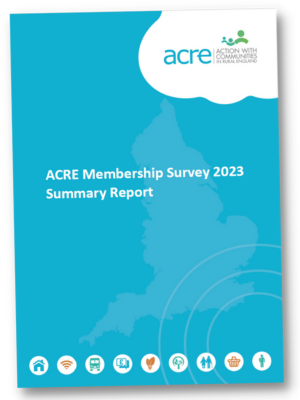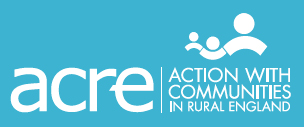Transport, health provision, loneliness and a lack of affordable housing top list of concerns identified by rural charities
5 October 2023
Research by Action with Communities in Rural England (ACRE) paints a picture of how organisations supporting rural communities have adapted post pandemic, and in response to the cost-of-living crisis
A lack of transport was cited as the biggest concern locally by 37 county-based charities working across England in support of rural communities in a recent survey, overtaking issues such as the pandemic and access to community facilities which were more obvious worries in 2020.
Concern for health and care provision, loneliness and isolation and a lack of affordable housing also featured prominently.
Members of the ACRE Network also reported significant increases in demand for their services across the board, most notably with respect to initiatives that seek to improve health and wellbeing and support with fuel poverty. In the past year alone, they responded to over 28,000 rural community groups – not far off the levels of demand seen at the height of the pandemic.
These changes appear to be linked to the circumstances that many rural households are finding themselves in due to cost-of-living pressures. As one respondent put it, “We’re seeing more and more people in rural areas falling into poverty as a result of energy, food and transport costs. Access to services is becoming more difficult, and young and old people are most likely to be adversely affected and more isolated as a result”.
Feedback tallies with existing evidence that suggests the cost-of-living crisis is being felt most keenly in the countryside with respect to fuel poverty, a lack of affordable housing and the costs of accessing services.
Many ACRE members have adapted by developing new services such as the provision of energy advice, helping village halls become ‘warm hubs’, and supporting food distribution schemes. But whilst there are many good examples of what can be achieved – there are concerns that available funding for such initiatives is not keeping pace with demand.
Although the amount of money levered in to support rural community initiatives increased in line with inflation from £34m in 2019/20 to £40m in 2022/23, many organisations completing the survey indicated that current and projected outgoings outstrip their income. This is in part due to diminishing national grant funding, but also increased operational costs such as staffing, rent and energy bills.
Reflecting on the data, Richard Quallington, ACRE’s Executive Director said, “This year’s survey paints a picture of the changing fortunes of rural communities. Many of the issues such as poor transport, access to services and a lack of affordable housing are not new, however the cost-of-living crisis is clearly resulting in an increasing number of people approaching members of the ACRE Network for support. It’s great to see our members flexing their services in response to this demand and supporting new community initiatives, but there is a risk they may become overstretched without significant new investment from funders.
In such tumultuous times, policy makers would be well served to reflect on the many excellent examples of community initiatives that exist in rural parts of the country where there is often a strong culture of mutual support in the absence of public goods and services. By backing local infrastructure organisations such as ACRE members, there is great potential to build on and scale up projects that build community resilience and address the many challenges people face today.”
Notes to editors
Media contact: Phillip Vincent, p.vincent@acre.org.uk, 01285 425645.
ACRE (Action with Communities in Rural England) is a charity speaking up for and supporting rural communities. It is the national body of the ACRE Network, England’s largest rural grouping of community support charities which support of initiatives that equip people with the knowledge, skills, and connections needed to improve their local community.
All 37 members of the ACRE Network completed a survey circulated Spring 2023 which asked a range of questions about their finances, services offered, the local area, corporate risks and their outlook on the future. A report summarising responses to the survey can be downloaded here.

Many of the issues such as poor transport, access to services and a lack of affordable housing are not new, however the cost-of-living crisis is clearly resulting in an increasing number of people approaching members of the ACRE Network for support.
Richard Quallington, ACRE’s Executive Director



